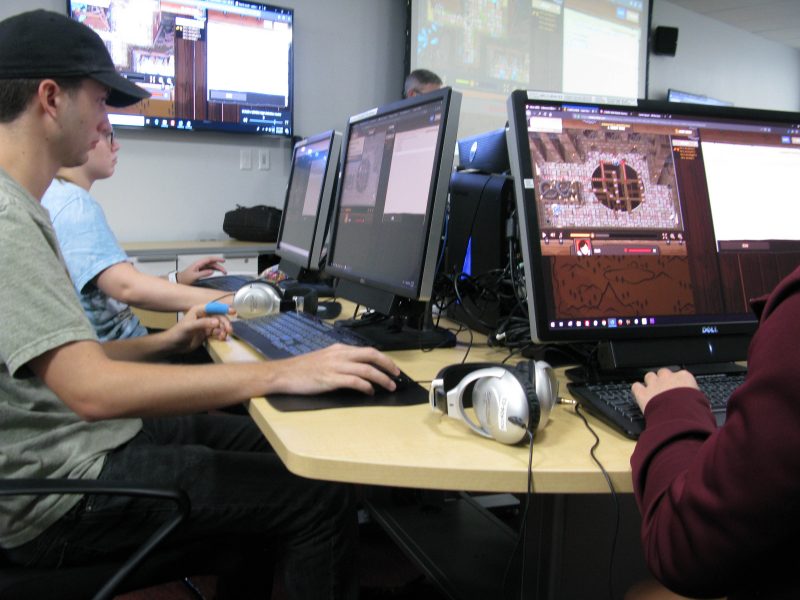This semester, Aaron Delwiche—professor of Communication—challenged the students in his Mobile Gaming class to create a do-it-yourself (DIY) project. The catch? The project must be in a creative area that the students are entirely unfamiliar with. Good at baking? Build a chair. Master painter? “Create a solar-powered emergency radio from an Altoids tin.” (That’s a verbatim example Delwiche offered in the project guidelines.)
Along with developing their original project, students are expected to give a three minute presentation to their class and write a blog post with footnotes documenting the experience.
While this project is mostly offline, Delwiche hopes it can help students tap into the resourceful and rebellious spirit that the internet fosters in young programmers.
“There’s this sort of do-it-yourself hacker ethic — hacker in a positive sense — culture on the internet that has a long history that can be traced back to punk rock and the ’60s and really accelerated with the birth of the Internet,” Delwiche said. “Many people have anxieties about technology and about programming. … The idea is to get people outside of their comfort zone and to have them throw themselves into the sea of information online and find resources that help them do the project.”
The assignment also encourages students to identify their learning style and find the resources that help them learn effectively.
“I might prefer a computer manual for learning how to use Photoshop, you might prefer a video. Part of being a self-reflective learner is along the way we figure out what works for us,” Delwiche said.
Rachel Lopez, a junior enrolled in Delwiche’s class, branched out into fashion for the first time by sewing a dress out of a bedsheet for her project. She got assistance from Jodi Karjala, costume designer for the department of Human Communication and Theatre.
“I’m super grateful for [Jodi], she’s letting me use her sewing machine from her workshop, so I’ll get to learn how to use a sewing machine,” Lopez said. “I’m still looking at all of the designs. I saw a pretty nice tutorial for a maxi dress, which is nice because you can hike or hem it up — since the bedsheet is naturally long, it might be a good starting project.”
Past projects for the class range from creating an iPhone camera lens from pieces from an old DVD player to cultivating cheese in a dorm room. One of the most memorable projects, according to Delwiche, was by recent Trinity graduate Andrea Acevedo, who created a fish tank that doubled as a way to water and fertilize plants embedded at the tank’s surface. Acevedo’s blog post was titled “Fish Are Friends (And Food?)”
Delwiche also shared an anecdote of a former Trinity student who created a potato cannon for his DIY project, inadvertently violating campus rules concerning weapons.
“I called TUPD and said, ‘Hey, this is what happened, can he bring [the potato cannon] to class?’ They’re like, ‘Oh my god, no. No weapons on campus,’ ” Delwiche said. “We kind of snuck it out of the dorm into the back of my car, and then I kept it in my house for the next three years because he was a first-year student at the time, but I eventually returned it to him when he wasn’t on campus, and he went out into the fields and played with it with his parents and brother and stuff.”
Thomas Johnson, senior, took the class last year and was inspired by the music documentary “It Might Get Loud,” featuring Jack White of the band The White Stripes. Johnson created a slide guitar.
“There’s clips of [White] building a guitar out of a block of wood, some nails, a string, and it picked up pretty good sound, and so I thought that’d be cool,” Johnson said.
Johnson spoke about the benefits of the project for his technological confidence.
“[The project] really made me feel more comfortable about going into coding because I’m like, ‘It’s going to be the same thing: If I want to get it done, it can be done,’ ” Johnson said.
Delwiche started this annual assignment in 2012, in response to Trinity’s “Information Literacy” Quality Enhancement Plan (QEP), which emphasized the importance of students learning to effectively synthesize information from different resources. Although the QEP theme has changed, Delwiche continues to assign this project every fall during the first few weeks of class.
Students who have questions about this project or who are interested in the class (listed as COMM 3444 on TigerPAWS) can email [email protected].













